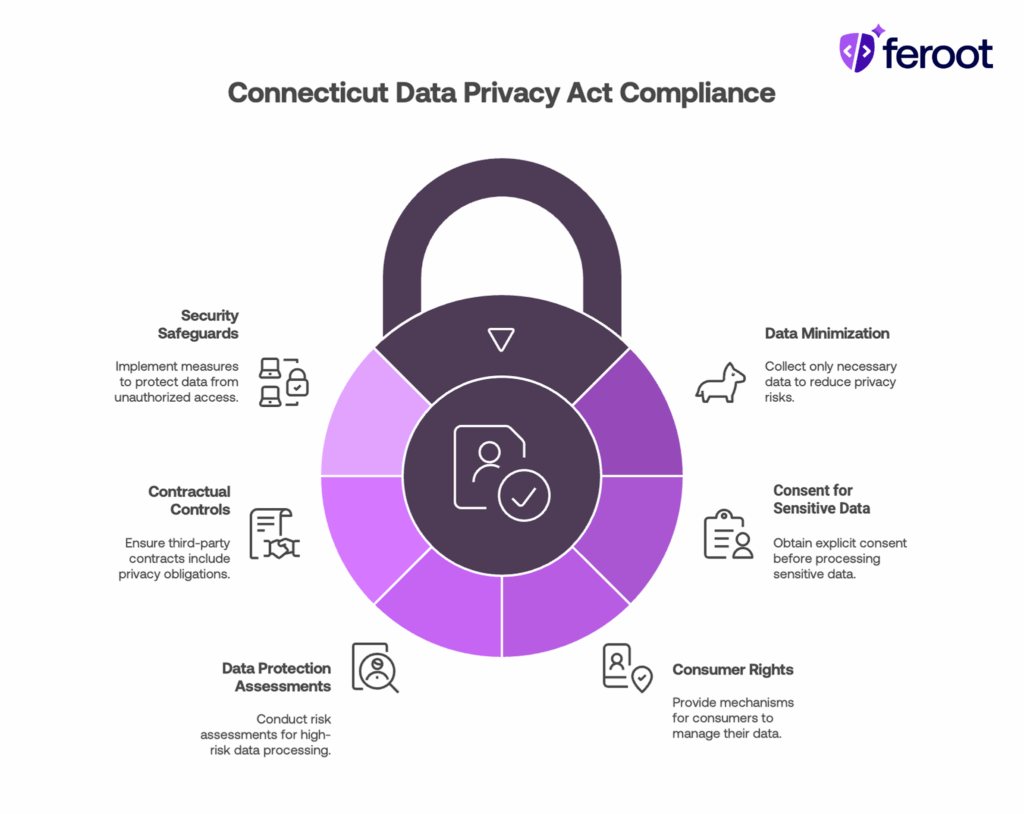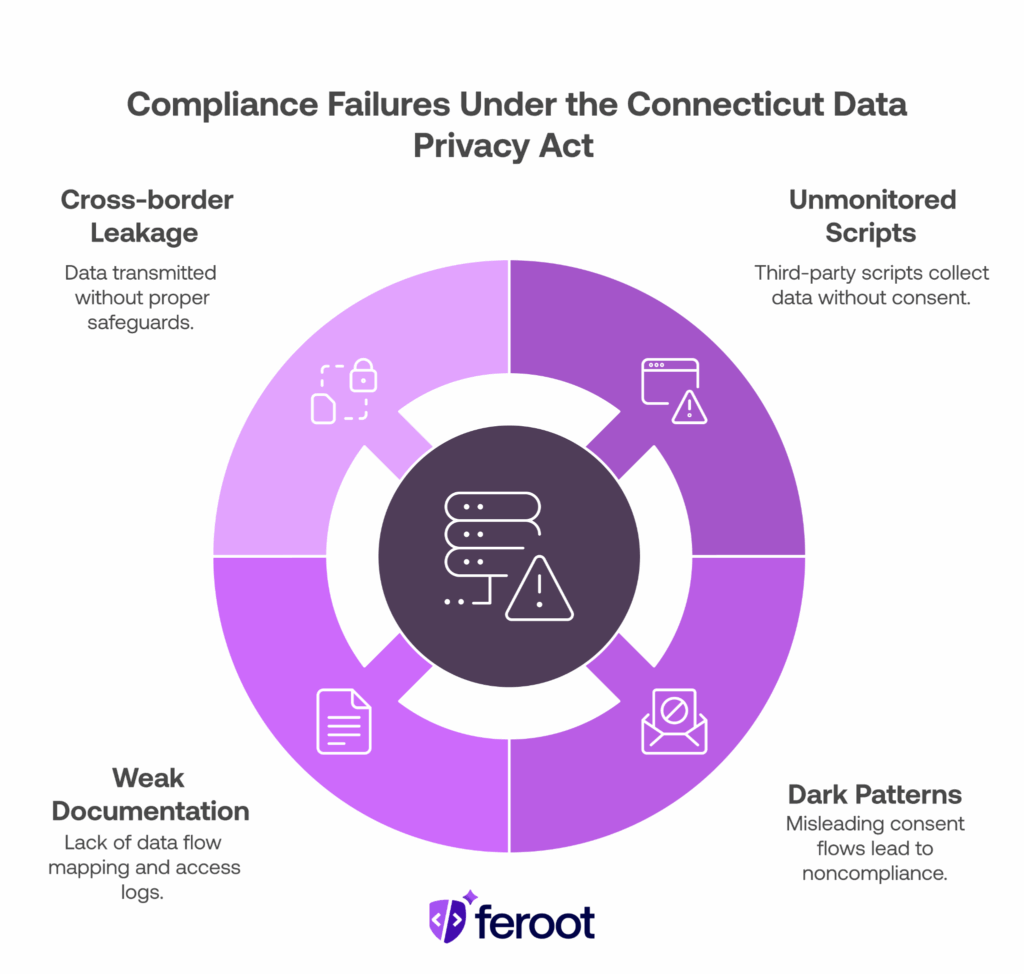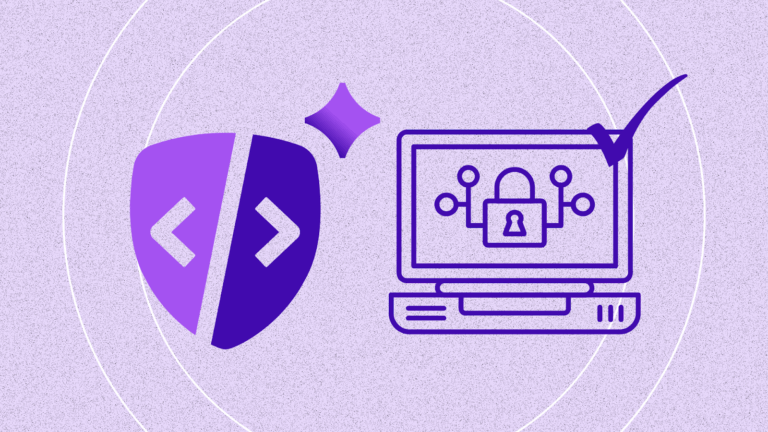TL;DR
- What it is: The Connecticut Data Privacy Act (CDPA), effective July 1, 2023, is Connecticut’s comprehensive privacy law modeled on Virginia and Colorado’s frameworks.
- Why it matters: It gives Connecticut residents more control over their personal data and imposes strict obligations on businesses handling that data.
- Who it applies to: For-profit businesses processing the personal data of at least 100,000 Connecticut residents annually, or 25,000 residents if deriving 25%+ revenue from selling data.
- Common pitfalls: Poor consent management, failure to monitor third-party scripts and trackers, weak data protection assessments, and lack of visibility into cross-border data flows.
- How Feroot helps: Feroot secures client-side data collection by monitoring scripts, detecting unauthorized access, and providing reporting to prove compliance.
Does the Connecticut Data Privacy Act (CDPA) apply to your business if you operate online?
For many U.S. companies, the answer is yes—and not just those physically located in Connecticut. Like the CCPA in California or the CPA in Colorado, the Connecticut Data Privacy Act has an extraterritorial reach, meaning if your website, SaaS platform, or e-commerce business processes Connecticut residents’ personal data at scale, compliance is mandatory.
The problem? CDPA compliance is rarely straightforward. While many organizations already focus on PCI DSS for payments or HIPAA for healthcare data, regulations like CDPA highlight new challenges—particularly around client-side risks like unmonitored third-party scripts, hidden trackers, and unauthorized data collection.
That’s where Feroot Security comes in. Beyond PCI and HIPAA, Feroot helps organizations achieve and maintain compliance with modern state privacy laws like CDPA by securing data flows at the point of collection: the client-side of your website or application.
What Is The Connecticut Data Privacy Act (CDPA)?
The Connecticut Data Privacy Act (CDPA) was signed into law in May 2022 and took effect on July 1, 2023. It is one of several state-level privacy laws designed to give consumers stronger rights over their personal information.
For-profit entities conducting business in Connecticut or targeting its residents must comply with the Connecticut Privacy Act, if they:
- Control or process the personal data of 100,000+ Connecticut residents annually (excluding data used solely for payment transactions), or
- Control or process the personal data of 25,000+ residents and derive 25%+ of revenue from selling data.
The Connecticut Data Privacy Act provides Connecticut residents with rights similar to GDPR and other state laws:
- The right to access, correct, delete, and port their data
- The right to opt out of targeted advertising, sales of personal data, and certain profiling practices
Key Compliance Requirements
Businesses subject to the Connecticut Data Privacy Act must implement measures such as:
- Data Minimization (Section 6(a)(1)) – Collect only what is reasonably necessary.
- Consent for Sensitive Data (Section 6(a)(2)) – Obtain clear consent before processing sensitive data (race, health, precise geolocation, children’s data).
- Consumer Rights (Sections 4 & 5) – Enable access, correction, deletion, portability, and opt-out mechanisms.
- Data Protection Assessments (Section 8) – Conduct risk assessments for high-risk processing activities (e.g., targeted ads, profiling, data sales).
- Contractual Controls (Section 9) – Ensure contracts with third-party processors include specific privacy and security obligations.
- Security Safeguards (Section 6(a)(3)) – Implement reasonable measures to protect data from unauthorized access.

Common Compliance Failures
Even well-prepared organizations struggle with the Connecticut Data Privacy Act due to client-side risks that traditional tools overlook:
- Unmonitored third-party scripts – Marketing tags, analytics trackers, and widgets silently collect personal data without consumer consent.
- Dark patterns in consent flows – Noncompliant opt-in or opt-out designs that mislead users can draw regulatory scrutiny.
- Weak documentation of data handling – Businesses fail to map data flows or log third-party access for audits.
- Cross-border leakage – Data transmitted to processors outside the U.S. without proper safeguards.

Real-world parallels: The Connecticut Attorney General has already signaled aggressive enforcement, pointing to violations of similar state laws like Colorado and California, where companies have faced multi-million-dollar settlements for unmonitored tracking technologies and consent failures.
How Feroot Helps
Feroot provides a purpose-built client-side security platform that directly addresses the CDPA’s most challenging requirements.
1. Data Minimization & Consent Enforcement
- Feroot AI maps every script running on your site—including hidden third-party trackers—to ensure you only collect necessary data.
- Detects unauthorized or excessive data collection that may exceed the “reasonably necessary” standard under Section 6.
2. Transparency for Consumer Rights
- Feroot AI shows how first- and third-party scripts interact with user data in real time.
- Provides visibility into what personal data is collected, where it flows, and who has access—helping businesses honor consumer rights requests (access, deletion, portability).
3. Data Protection Assessments
- Real-Time Alerts flag unusual script behavior, injections, or attempts to collect sensitive categories of data without consent.
- Security teams can integrate these findings into Data Protection Assessments (Section 8) as documented proof of risk analysis.
4. Third-Party Contractual Controls
- Feroot’s monitoring tools let you verify whether vendors and processors meet the Connecticut Data Privacy Act’s requirements.
- Continuous validation ensures your third-party processors don’t violate privacy obligations on your behalf.
5. Audit-Ready Reporting
- Compliance Reporting features provide audit logs, dashboards, and visual evidence of data protection measures.
- Demonstrates compliance with Section 6(a)(3) (reasonable safeguards) and Section 9 (processor accountability).
By securing the client-side attack surface, Feroot enables organizations to align with CDPA requirements while avoiding costly fines, lawsuits, and brand damage.
FAQ
What are the penalties for violating the Connecticut Data Privacy Act?
The Connecticut Attorney General can seek civil penalties of up to $5,000 per willful violation, plus injunctive relief and restitution.
Does the Connecticut Data Privacy Act apply to websites that use third-party trackers?
Yes. If your business meets the thresholds, you are responsible for all personal data collected through your site—including data captured by embedded third-party scripts and pixels.
Can script monitoring help with Connecticut Data Privacy Act compliance?
Absolutely. Without monitoring, you may unknowingly process data without valid consent, violating Sections 4, 5, or 6. Feroot provides this visibility.
How can I prove to auditors that my site is secure?
Feroot’s reporting tools generate audit logs and visual maps of script activity, providing regulators with proof of compliance.
What tools are available to detect unauthorized third-party data collection?
Feroot AI continuously detects and alerts on unauthorized data collection, ensuring CDPA compliance on the client side.
Conclusion
The Connecticut Data Privacy Act raises the bar for data protection in the U.S., extending obligations beyond PCI DSS and HIPAA. Businesses processing data from Connecticut residents must now balance consumer rights, vendor accountability, and client-side security to remain compliant.
Feroot is uniquely positioned to help. By securing the client-side of websites and web applications, Feroot empowers organizations to enforce consent, monitor scripts, prevent unauthorized access, and provide audit-ready evidence of compliance.


